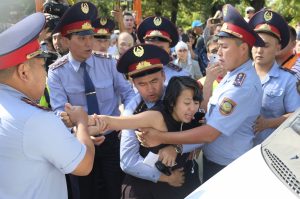Unsanctioned rallies scheduled by two different opposition groups in Kazakhstan for this past weekend were preempted by arrests. On February 22, the day of demonstrations called for by both the unregistered Democratic Party and Mukhtar Ablyazov’s banned Democratic Choice of Kazakhstan movement, as many as 200 were arrested in now-familiar scenes.
Earlier in February, Kazakh authorities released for public review a draft of much-anticipated legislation aimed to reform the country’s protest laws. The bill comes more than eight months after President Kassym-Jomart Tokayev promised reforms, but falls short of what many activists hoped for.
The Democratic Party of Kazakhstan, led by former journalist and activist Zhanbolat Mamai, had planned to hold a founding congress in Almaty, Kazakhstan’s biggest city, on February 22. Kazakh law mandates that at least 1,000 people be present for the founding congress of a party in order to be registered, in addition to the party having 40,000 members. As I commented last week, “It’s virtually impossible for an opposition movement to attain official registration” given these thresholds and early pressure on nascent parties.
A number of Democratic Party party activists were detained or otherwise delayed in traveling to Almaty, prompting Mamai to cancel the congress on February 19 and call on supporters to protest instead. Mamai was arrested on February 21 while attending a court hearing for one of his previously arrested party colleagues, Zhanbol Rakhmetulla.
Mamai was sentenced to three days’ detention, the charge being that he called for an unsanctioned rally. According to RFE/RL Mamai’s wife, Inga Imanbai, told those gathered: “Were we asked whether we wanted a street named after Nazarbayev, or the capital to be named Nur-Sultan? We used to laugh about North Korea and Turkmenistan. Nazarbayev’s power will end. The Democratic Party will be, and will win.” She was then pulled into a police van.
Also on February 22, Mukhtar Ablyazov called on his followers to rally. The Kazakh Prosecutor General warned people to not participate, saying in a statement: “Any actions by any person to organize or take part in an unsanctioned public event will be suppressed…The Prosecutor-General’s office calls on citizens to strictly follow laws and stay away from provocations and participation in illegal public activities.”
President Tokayev was ushered into office last summer amid a string of protests touched off by the quick and managed transfer of the presidency. On March 19, Kazakhstan’s first president, Nursultan Nazarbayev, resigned. Tokayev, the chairman of the Kazakh Senate, became interim president, as per the Kazakh Constitution. Within a month, the Kazakh capital had been renamed in Nazarbayev’s honor and Tokayev called for snap presidential elections, set to occur in June 2019. Needless to say, Tokayev was elected president and opposition forces were unable to muster much of a contest.
Tokayev promised reforms to the country’s restrictive protest laws, which both make it difficult to obtain approval and punish unsanctioned rallies despite commitments in the country’s constitution to freedom of expression.
After eight months, Kazakh authorities have released for public review a draft of the proposed new protest legislation. But as Yelnur Alimova highlighted in an article today for Eurasianet, the draft is a far cry from what activists wanted.
One particularly problematic portion of the new law sets out regulations for the organizer of a protest. Not only must the organizer be present at the rally (arguably meaning that a sanctioned rally would become unsanctioned if the organizer could not physically attend), but organizers cannot have previously been convicted of a range of crimes including “participating in mass riots” and the notoriously broad range of “incitement” charges. Most damagingly, however, the proposed law bars Kazakhs who have previously been subjected to administrative penalties for violating earlier laws on organizing rallies. Any activist who has been scooped up and detained for 15 or seven or three days for organizing an unsanctioned rally cannot in the future organize one under the proposed law.
Alimova’s article features several Kazakh activists criticizing the draft law (and highlighting its various deficiencies), calling into question just who the Kazakh government bothered to consult in its creation.
Kazakhstan remains an autocracy in a democracy’s clothing: It holds elections, but it’s all-but-impossible for new political parties to take root, grow, and gain influence. The Democratic Party’s plight is a prime example. People are guaranteed the right to expression by a constitution, but in practice the state sets strict limits on the content and context of that expression. If the proposed new law is anything to judge by, we can expect more of the same.
































